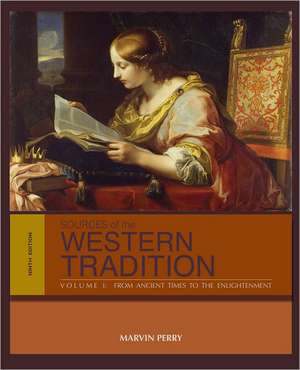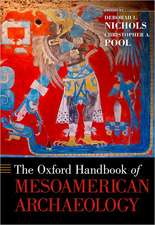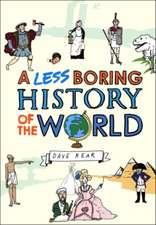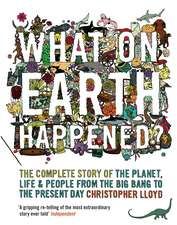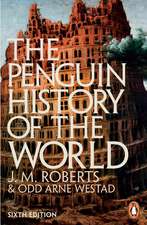Sources of the Western Tradition: From Ancient Times to the Enlightenment
Autor Marvin Perryen Limba Engleză Paperback – 26 dec 2012
Preț: 525.44 lei
Preț vechi: 614.71 lei
-15% Nou
Puncte Express: 788
Preț estimativ în valută:
100.55€ • 107.52$ • 83.83£
100.55€ • 107.52$ • 83.83£
Carte disponibilă
Livrare economică 27 martie-10 aprilie
Preluare comenzi: 021 569.72.76
Specificații
ISBN-13: 9781133935254
ISBN-10: 1133935257
Pagini: 480
Dimensiuni: 185 x 229 x 23 mm
Greutate: 0.77 kg
Ediția:Revised
Editura: Wadsworth Publishing
ISBN-10: 1133935257
Pagini: 480
Dimensiuni: 185 x 229 x 23 mm
Greutate: 0.77 kg
Ediția:Revised
Editura: Wadsworth Publishing
Notă biografică
Marvin Perry is retired Professor of History at Baruch College, City University of New York. He has published several successful Cengage Learning texts, including WESTERN CIVILIZATION: IDEAS, POLITICS, AND SOCIETY; WESTERN CIVILIZATION: A BRIEF HISTORY; the leading Western Civilization reader, SOURCES OF THE WESTERN TRADITION; AN INTELLECTUAL HISTORY OF MODERN EUROPE; SOURCES OF EUROPEAN HISTORY SINCE 1900 (senior editor); HUMANITIES IN THE WESTERN TRADITION (senior author and general editor); and WORLD WAR II IN EUROPE: A CONCISE HISTORY. Dr. Perry's scholarly work focuses on the history of ideas.
Cuprins
Part I: THE ANCIENT WORLD. 1. The Near East. 1. Mesopotamian Protest Against Death. 2. Mesopotamian Concepts of Justice. 3. Divine Kingship in Egypt. 4. Religious Inspiration of Akhenaten. 5. Love, Passion, and Misogyny in Ancient Egypt. 6. Empire Builders. 7. The Myth-Making Outlook of the Ancient Near East. 2. The Hebrews. 1. Hebrew Cosmogony and Anthropology. 2. Human Sinfulness. 3. The Covenant and the Ten Commandments. 4. Humaneness of Hebrew Law. 5. God's Greatness and Human Dignity. 6. The Age of Classical Prophecy. 3. The Greeks. 1. Homer: The Educator of Greece. 2. Lyric Poetry. 3. The Emancipation of Thought from Myth. 4. Humanism. 5. The Persian Wars. 6. Greek Drama. 7. Athenian Greatness. 8. The Status of Women in Classical Greek Society. 9. The Peloponnesian War. 10. Socrates: The Rational Individual. 11. Plato: The Philosopher-King. 12. Aristotle: Science, Politics, and Ethics. 13. Hellenistic Culture: Rationalism, Universalism, and Individualism. 4. The Roman Republic. 1. Rome's March to World Empire. 2. The Punic Wars. 3. The Spread of Greek Philosophy to Rome. 4. Exploitation of the Provinces. 5. Roman Slavery. 6. Women in Republican Society. 7. The Decline of the Republic. 5. The Roman Empire. 1. The Imperial Office. 2. Imperial Culture. 3. Roman Stoicism. 4. Roman Law. 5. Provincial Administration. 6. The Roman Peace. 7. Third-Century Crisis. 8. The Demise of Rome. 6. Early Christianity. 1. The Teachings of Jesus. 2. The Dead Sea Scrolls. 3. Christianity and Greco-Roman Learning. 4. The Persecutions. 5. Monastic Life. 6. Christianity and Society. 7. Jews in the Era of Early Christianity. 8. The Christian World-View. Part II: THE MIDDLE AGES. 7. The Early Middle Ages. 1. The Byzantine Cultural Achievement. 2. Islam. 3. Muslim Relations with Christians and Jews. 4. Jihad. 5. Islam and Greek Learning. 6. Converting the Germanic Peoples to Christianity. 7. The Transmission of Learning. 8. The Carolingian Renaissance. 9. The Feudal Lord: Vassal and Warrior. 10. The Burdens of Serfdom. 8. The High and Late Middle Ages. 1. The Revival of Trade and the Growth of Towns. 2. Papal Supremacy. 3. The Crusades. 4. Religious Dissent. 5. Medieval Learning: Synthesis of Reason and Christian Faith. 6. Medieval Universities. 7. The Jews in the Middle Ages. 8. Troubadour Love Songs. 9. The Status of Women in Medieval Society. 10. Sexual Nonconformity: Satan's Lures. 11. Medieval Contributions to the Tradition of Liberty. 12. The Fourteenth Century: An Age of Adversity. 13. The Medieval Church in Crisis. 14. The Medieval World-View. Part III: EARLY MODERN EUROPE. 9. The Renaissance. 1. The Humanists' Fascination with Antiquity. 2. Human Dignity. 3. Individualism. 4. Break with Medieval Political Theory. 5. The Ideal Gentleman. 6. The Genius of Leonardo da Vinci. 7. Learned Renaissance Women. 8. The Spread of the Renaissance. 10. The Reformation. 1. A Catholic Critic of the Church. 2. The Lutheran Reformation. 3. The German Peasants' Revolt. 4. Luther and the Jews. 5. The Calvinist Reformation. 6. The Catholic Response to Protestantism. 7. Religious Persecution. 11. Early Modern Society and Politics. 1. The Age of Exploration and Conquest. 2. Spanish Oppression of Amerindians. 3. Toward the Modern Economy: The Example of Holland. 4. The Jews of Spain and Portugal: Expulsion, Forced Conversion, Inquisition. 5. The Atlantic Slave Trade. 6. The Witch Craze. 7. The Court of Louis XIV. 8. Justification of Absolute Monarchy by Divine Right. 9. A Secular Defense of Absolutism. 10. The Triumph of Constitutional Monarchy in England: The Glorious Revolution. 12. The Scientific Revolution. 1. The Copernican Revolution. 2. Galileo: Confirming the Copernican System. 3. Prophet of Modern Science. 4. The Autonomy of the Mind. 5. The Mechanical Universe. 6. The Limitations of Science. 13. The Enlightenment. 1. The Enlightenment Outlook. 2. Political Liberty. 3. Attack on Religion. 4. Epistemology. 5. Compendium of Knowledge. 6. Rousseau: Political Reform. 7. Humanitarianism. 8. Literature as Satire: Critiques of European Society. 9. Madame du Chatelet: A Woman of Brilliance. 10. On the Progress of Humanity.
Recenzii
Part I: THE ANCIENT WORLD. 1. The Near East. 1. Mesopotamian Protest Against Death. 2. Mesopotamian Concepts of Justice. 3. Divine Kingship in Egypt. 4. Religious Inspiration of Akhenaten. 5. Love, Passion, and Misogyny in Ancient Egypt. 6. Empire Builders. 7. The Myth-Making Outlook of the Ancient Near East. 2. The Hebrews. 1. Hebrew Cosmogony and Anthropology. 2. Human Sinfulness. 3. The Covenant and the Ten Commandments. 4. Humaneness of Hebrew Law. 5. God's Greatness and Human Dignity. 6. The Age of Classical Prophecy. 3. The Greeks. 1. Homer: The Educator of Greece. 2. Lyric Poetry. 3. The Emancipation of Thought from Myth. 4. Humanism. 5. The Persian Wars. 6. Greek Drama. 7. Athenian Greatness. 8. The Status of Women in Classical Greek Society. 9. The Peloponnesian War. 10. Socrates: The Rational Individual. 11. Plato: The Philosopher-King. 12. Aristotle: Science, Politics, and Ethics. 13. Hellenistic Culture: Rationalism, Universalism, and Individualism. 4. The Roman Republic. 1. Rome's March to World Empire. 2. The Punic Wars. 3. The Spread of Greek Philosophy to Rome. 4. Exploitation of the Provinces. 5. Roman Slavery. 6. Women in Republican Society. 7. The Decline of the Republic. 5. The Roman Empire. 1. The Imperial Office. 2. Imperial Culture. 3. Roman Stoicism. 4. Roman Law. 5. Provincial Administration. 6. The Roman Peace. 7. Third-Century Crisis. 8. The Demise of Rome. 6. Early Christianity. 1. The Teachings of Jesus. 2. The Dead Sea Scrolls. 3. Christianity and Greco-Roman Learning. 4. The Persecutions. 5. Monastic Life. 6. Christianity and Society. 7. Jews in the Era of Early Christianity. 8. The Christian World-View. Part II: THE MIDDLE AGES. 7. The Early Middle Ages. 1. The Byzantine Cultural Achievement. 2. Islam. 3. Muslim Relations with Christians and Jews. 4. Jihad. 5. Islam and Greek Learning. 6. Converting the Germanic Peoples to Christianity. 7. The Transmission of Learning. 8. The Carolingian Renaissance. 9. The Feudal Lord: Vassal and Warrior. 10. The Burdens of Serfdom. 8. The High and Late Middle Ages. 1. The Revival of Trade and the Growth of Towns. 2. Papal Supremacy. 3. The Crusades. 4. Religious Dissent. 5. Medieval Learning: Synthesis of Reason and Christian Faith. 6. Medieval Universities. 7. The Jews in the Middle Ages. 8. Troubadour Love Songs. 9. The Status of Women in Medieval Society. 10. Sexual Nonconformity: Satan's Lures. 11. Medieval Contributions to the Tradition of Liberty. 12. The Fourteenth Century: An Age of Adversity. 13. The Medieval Church in Crisis. 14. The Medieval World-View. Part III: EARLY MODERN EUROPE. 9. The Renaissance. 1. The Humanists' Fascination with Antiquity. 2. Human Dignity. 3. Individualism. 4. Break with Medieval Political Theory. 5. The Ideal Gentleman. 6. The Genius of Leonardo da Vinci. 7. Learned Renaissance Women. 8. The Spread of the Renaissance. 10. The Reformation. 1. A Catholic Critic of the Church. 2. The Lutheran Reformation. 3. The German Peasants' Revolt. 4. Luther and the Jews. 5. The Calvinist Reformation. 6. The Catholic Response to Protestantism. 7. Religious Persecution. 11. Early Modern Society and Politics. 1. The Age of Exploration and Conquest. 2. Spanish Oppression of Amerindians. 3. Toward the Modern Economy: The Example of Holland. 4. The Jews of Spain and Portugal: Expulsion, Forced Conversion, Inquisition. 5. The Atlantic Slave Trade. 6. The Witch Craze. 7. The Court of Louis XIV. 8. Justification of Absolute Monarchy by Divine Right. 9. A Secular Defense of Absolutism. 10. The Triumph of Constitutional Monarchy in England: The Glorious Revolution. 12. The Scientific Revolution. 1. The Copernican Revolution. 2. Galileo: Confirming the Copernican System. 3. Prophet of Modern Science. 4. The Autonomy of the Mind. 5. The Mechanical Universe. 6. The Limitations of Science. 13. The Enlightenment. 1. The Enlightenment Outlook. 2. Political Liberty. 3. Attack on Religion. 4. Epistemology. 5. Compendium of Knowledge. 6. Rousseau: Political Reform. 7. Humanitarianism. 8. Literature as Satire: Critiques of European Society. 9. Madame du Chatelet: A Woman of Brilliance. 10. On the Progress of Humanity.
